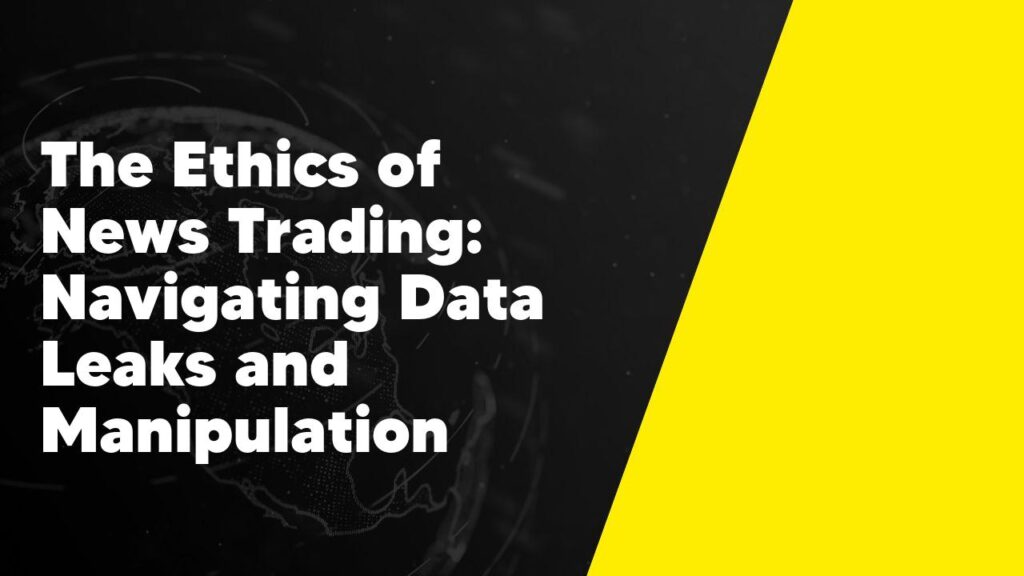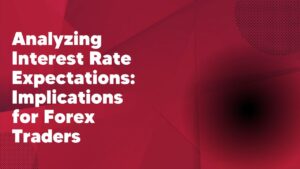News trading, which involves making financial decisions based on market-moving news events, has become increasingly popular in recent years. However, the ethics surrounding this practice have become a topic of intense debate. One of the key ethical concerns is the use of insider information or data leaks to gain an unfair advantage in the markets. This can lead to manipulation and exploitation of the financial system, posing risks to both individual investors and the overall market stability. In this paper, we will explore the ethical dilemmas associated with news trading, with a particular focus on navigating data leaks and manipulation. We will examine the different perspectives and arguments surrounding this issue, considering both the potential benefits and the harmful consequences of news trading. Through a comprehensive analysis, we hope to shed light on the complex ethical considerations that arise in the world of news trading and provide insights for regulators, investors, and the general public.
Ethical dilemmas in news trading
News trading in the forex industry raises ethical dilemmas due to the potential for market manipulation and unfair advantages. Traders can gain an edge by obtaining confidential information ahead of public release or by disseminating false news to manipulate prices. This creates an uneven playing field and undermines market integrity. Additionally, traders can exploit news releases to profit from short-term market fluctuations, often at the expense of long-term investors. Such practices are considered unethical and may lead to reputational damage for individuals and the industry as a whole. Regulators have implemented strict rules and surveillance mechanisms to detect and deter unethical behavior in news trading, including monitoring trading patterns and investigating suspicious activities. Market participants are encouraged to maintain high ethical standards and adhere to compliance regulations to foster trust and transparency in the forex market. Ultimately, ethical news trading requires market participants to act with integrity, honesty, and fairness, ensuring a level playing field for all traders.
Managing data leaks in journalism
Data leaks have become a pressing concern in the world of journalism. With the rise of technology and the increasing digitization of information, journalists are constantly handling sensitive data that can be vulnerable to leaks. As an experienced content writer in the Forex industry, I understand the importance of data security and the potential consequences that data leaks can have on the field of journalism. It is crucial for journalists to implement effective strategies to manage data leaks and protect the confidentiality of their sources and the integrity of their work. This can be achieved through various measures such as encryption, secure communication channels, and strict access controls. Additionally, journalists should also be cautious when collaborating and sharing information with external organizations or platforms to minimize the risk of data leaks. By prioritizing data security and staying up-to-date with the latest technological advancements and best practices, journalists can ensure the integrity of their work and maintain the trust of their sources and readers.
Navigating news manipulation ethically
As an experienced content writer in the Forex industry, navigating news manipulation ethically is of utmost importance. In an industry where volatility is the norm, staying informed about market events is crucial for traders. However, news manipulation can greatly affect the accuracy and reliability of the information available. To navigate this challenge ethically, it is important to rely on trusted news sources that have a proven track record of unbiased reporting. It is also essential to critically analyze and cross-verify information before using it in content. This can involve checking multiple sources, comparing different perspectives, and fact-checking with reputable organizations. Transparency is key when dealing with news manipulation, and it is important to disclose any conflicts of interest or potential biases that may impact the content being written. By maintaining high ethical standards, content writers in the Forex industry can help traders make more informed decisions and foster a trustworthy and reliable trading environment.
Consequences of unethical news trading
Unethical news trading, often referred to as insider trading, has severe consequences within the forex industry. Firstly, it undermines market integrity and fairness, as it gives certain individuals an unfair advantage over others. This erodes trust and confidence in the markets, leading to a decline in overall participation and liquidity. Additionally, unethical news trading can distort price movements and create artificial volatility, making it more difficult for traders to accurately analyze and predict market trends. This can result in significant financial losses for those who are unknowingly trading against manipulated prices. Furthermore, unethical news trading is illegal in many jurisdictions and can lead to serious legal repercussions, including fines and imprisonment. Regulators actively monitor and investigate suspicious trading activities, and penalties have been imposed on individuals and financial institutions found to engage in such practices. Ultimately, the consequences of unethical news trading not only impact individual traders, but also have broader implications for market stability and investor confidence within the forex industry.
Guidelines for responsible news reporting
In the fast-paced world of Forex trading, responsible news reporting is crucial for maintaining transparency and fostering trust among traders. Firstly, journalists should ensure accuracy by diligently fact-checking information from multiple sources before publishing anything. This helps in avoiding misleading or false news that can significantly impact market sentiments. Secondly, news articles should provide a balanced perspective by presenting both the positive and negative aspects of the news. This allows traders to make informed decisions based on a comprehensive understanding of the situation. Thirdly, it is essential to disclose any potential conflicts of interest to maintain journalistic integrity. This enables traders to assess the credibility of the information provided. Additionally, journalists should clearly distinguish between facts and opinions, clearly labeling any statements that are subjective or speculative. This allows traders to differentiate between objective news and personal interpretations, preventing confusion and misinterpretation. Lastly, responsible news reporting should prioritize potential impacts on the Forex market, guiding traders on how to navigate volatility and manage risks effectively. By adhering to these guidelines, journalists contribute to a more transparent and accountable Forex industry, enhancing confidence and professionalism among traders.
Impact of data leaks on public trust
Data leaks can have a significant impact on public trust, particularly in the Forex industry. When sensitive information is exposed through these leaks, it can erode the confidence that individuals have in the security and privacy measures put in place by Forex companies. This loss of trust can lead to a decrease in the number of individuals willing to engage in Forex transactions and investments. It can also have a negative effect on the overall reputation of the industry as a whole. Additionally, data leaks can result in financial losses for both individuals and companies, as personal and financial information can be used for fraud or other illicit purposes. In order to mitigate the impact of data leaks on public trust, Forex companies must prioritize security measures and continuously invest in advanced technologies that can protect sensitive information. By demonstrating a commitment to data protection, transparency, and accountability, Forex companies can work towards rebuilding public trust and maintaining a strong reputation within the industry. It is crucial for organizations to proactively address any potential vulnerabilities and promptly communicate any data breaches to affected individuals. Building strong relationships with customers and stakeholders can also play a vital role in restoring public confidence in the Forex industry in the wake of data leaks.
Balancing transparency and privacy concerns
In the Forex industry, finding the right balance between transparency and privacy is crucial. Traders and investors rely on transparent information to make informed decisions, yet they also value their privacy. Maintaining transparency is essential for building trust and fostering a healthy market environment. This involves providing accurate and real-time market data, ensuring fair and orderly transactions, and disclosing relevant information to clients. However, privacy concerns also need to be addressed, especially when it comes to personal and financial information. Forex brokers must implement robust security measures to safeguard client data and protect against unauthorized access. Striking the right balance requires industry standards and regulations that promote transparency while respecting privacy rights. By promoting transparency, the Forex industry can demonstrate its commitment to integrity and build trust with traders and investors. At the same time, respecting privacy rights enhances client confidence and encourages individuals to engage in Forex trading without fear of their personal information being compromised. Achieving this balance is essential for the long-term success and sustainability of the Forex industry.
Ethical considerations in newsroom decision-making
Ethical considerations play a crucial role in the decision-making process within the newsroom. Journalists have a responsibility to uphold the principles of fairness, accuracy, and objectivity when reporting on forex-related matters. It is imperative to ensure that the information presented to the public is factual and unbiased, as it can have a significant impact on the financial markets and investors’ decisions. Transparency is key when it comes to disclosing any conflicts of interest or biases that may influence the reporting process. Additionally, journalists must exercise caution when reporting on sensitive topics, such as market rumors or potential market manipulation, and carefully weigh the potential consequences of their actions. Adhering to a strong code of ethics helps to build trust with the audience and maintain the integrity of the forex industry. Ultimately, ethical considerations should guide journalists in their decision-making to responsibly inform and educate the public about the complexities of the forex market while avoiding any potential harm or misinformation.
Conclusion
In conclusion, the ethics surrounding news trading and data leaks and manipulation raise significant concerns about the integrity and trustworthiness of the media industry. While news trading can provide financial benefits for traders, it can compromise the accuracy and reliability of the news being disseminated. The use of data leaks and manipulation to gain a competitive edge further undermines the credibility of news organizations, as it distorts the information being presented to the public. Upholding ethical standards in news trading is crucial to ensure transparency, accountability, and the public’s access to unbiased and reliable information. It requires a collaborative effort between news organizations, regulators, and traders to establish clear guidelines and enforce strict regulations that discourage unethical practices. Ultimately, prioritizing ethical behavior in news trading is essential for maintaining the integrity of the media industry and preserving public trust in the information they receive.
FAQ 1: What is news trading?
News trading is a strategy used by traders to exploit market movements and volatility that result from the release of important news events. It involves analyzing the impact of news releases on financial markets and making decisions based on this analysis.
FAQ 2: How does news trading work?
News trading works by monitoring and analyzing important news events that may impact financial markets. Traders aim to anticipate market reactions to these news releases and take positions accordingly, either by buying or selling financial instruments.
FAQ 3: Is news trading legal?
While news trading itself is legal, certain unethical practices associated with it, such as insider trading or spreading false information, are illegal. It is important to understand and comply with local regulations and ethical guidelines when engaging in news trading.
FAQ 4: What are the risks of news trading?
The risks of news trading include market volatility, slippage, and timing risks. Market reactions to news releases can be unpredictable, leading to increased price volatility and potential losses. It is essential for traders to have a robust risk management strategy in place.
FAQ 5: How can I navigate the ethics of news trading?
Navigating the ethics of news trading requires staying informed about and adhering to ethical guidelines and regulatory frameworks in your jurisdiction. It is important to rely on legitimate news sources, avoid spreading false information, and consider the potential impact of your trades on others.
FAQ 6: What are some best practices for news trading?
Some best practices for news trading include conducting thorough research, developing a trading plan, managing risk effectively, being disciplined with your trading decisions, and continuously learning and adapting to changing market conditions.


